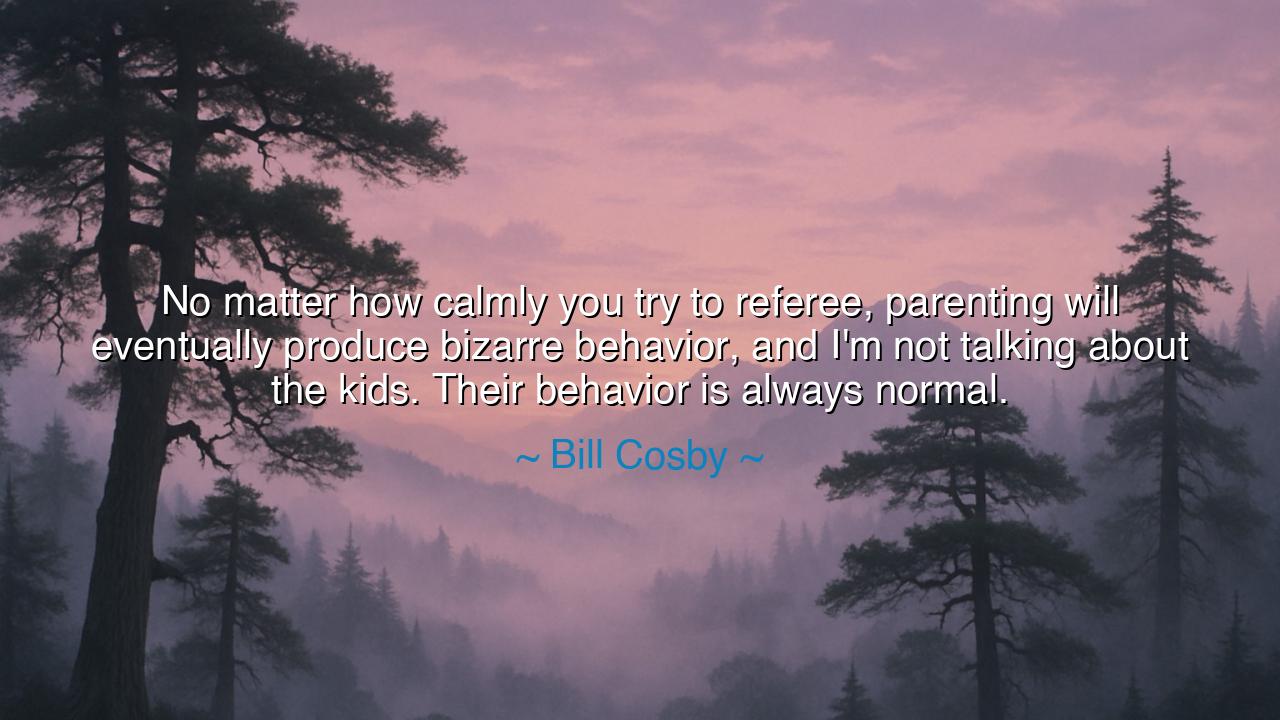
No matter how calmly you try to referee, parenting will
No matter how calmly you try to referee, parenting will eventually produce bizarre behavior, and I'm not talking about the kids. Their behavior is always normal.






The words of Bill Cosby, though wrapped in humor, carry a deeper wisdom than they first appear: “No matter how calmly you try to referee, parenting will eventually produce bizarre behavior, and I'm not talking about the kids. Their behavior is always normal.” Beneath the laughter lies a truth carved into the very fabric of human life—that to raise children is to wrestle not only with their nature, but with one’s own. For in the struggle of parenting, it is not the child who is tested most, but the parent, who is transformed in ways both strange and profound.
Since the beginning of time, elders have known that the innocence and chaos of children are part of life’s natural order. The behavior of children—their cries, their stubbornness, their endless questions—are but the voices of growth seeking to understand the world. It is the parent, attempting to impose calm, reason, and order, who often discovers within themselves a storm they did not expect. What they once thought of as patience is shattered, what they once believed to be unshakable calm erupts into fiery outbursts or tears. The “bizarre behavior” Cosby speaks of is this transformation of the adult soul when confronted with the relentless energy of youth.
Let us remember the tale of Socrates, who, though remembered as the wisest of Athens, confessed that he could endure debates with the sharpest philosophers, yet found the daily quarrels of family life to be his truest test. His wife Xanthippe was said to be sharp-tongued, and his children unruly. When a friend asked why he endured such storms, Socrates replied that one who can master the tempests of a household can face any storm of state. This is no different today: the battlefield of the home is where the spirit of the parent is refined.
Indeed, history teaches us that parenting reshapes even the greatest of men and women. Consider Theodore Roosevelt, fierce soldier and president, who confessed that managing his young children in the White House was a trial greater than the charge up San Juan Hill. His children played pranks, released animals indoors, and turned the stately halls into arenas of chaos. Yet Roosevelt, instead of suppressing this energy, allowed himself to join in their games, discovering laughter and humility amidst the grandeur of power. His children’s “normal” behavior called forth in him a side the world had never seen.
Thus, Cosby’s words are not mockery, but revelation: the strangeness of parental behavior is born from the weight of love, fear, and responsibility. When a parent shouts over spilled milk, we know it is not the milk, but the exhaustion behind it. When they laugh inappropriately or weep without cause, it is because love has stretched their heart until it no longer resembles its former shape. Parenting does not merely raise children; it remakes adults into beings both stronger and stranger than before.
The lesson, then, is twofold. First, do not condemn yourself when you, as a parent, act in ways that surprise you. This “bizarre behavior” is a sign of your humanity, proof that you care so deeply that your emotions overflow the vessel. Second, remember that your child’s behavior, however frustrating, is the natural course of childhood. To expect them to be calm and orderly is to deny them the storms through which character is forged.
Practically, this means embracing humility in parenting. When you falter, apologize—your children will learn more from your honesty than from your perfection. Create moments of joy amidst the chaos, for laughter heals the strain of discipline. Seek support from fellow parents, for just as soldiers share the weight of war, so too must mothers and fathers share the burdens of the household. Above all, remind yourself daily that the goal is not to sculpt perfect children, but to walk with them as they become themselves, even as you, too, are becoming someone new.
So let us take these words to heart: parenting is not merely the guiding of children, but the remaking of parents. And though the path is filled with moments that appear absurd, it is in those very absurdities that the sacred bond between parent and child is born. For in the strangeness of our reactions, love reveals itself—not tidy, not polished, but raw, human, and enduring.






AAdministratorAdministrator
Welcome, honored guests. Please leave a comment, we will respond soon